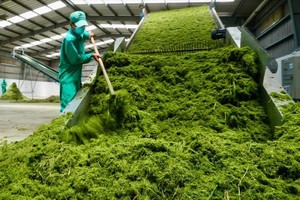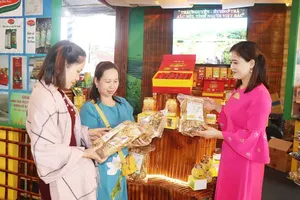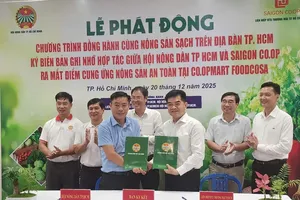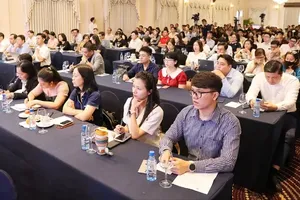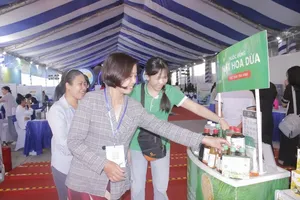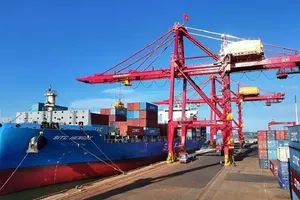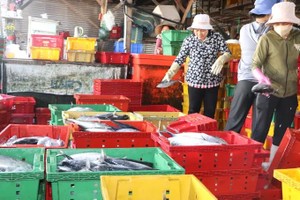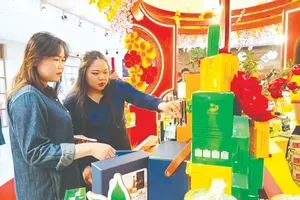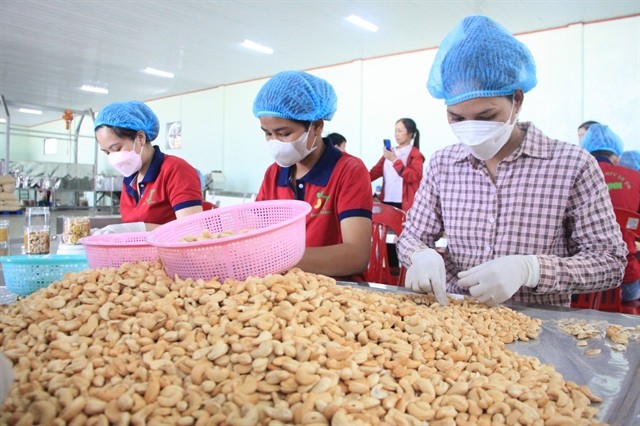 |
Cashew nuts packed at a factory in Binh Phuoc Province. — VNA/VNS Photo |
Cashew exports are likely to strongly rebound by the end of the year after significant growth in both volume and value in the past eight months of this year, industry insiders have said.
Data from the Vietnam Cashew Association shows that in August, the country exported nearly 64,000 tons of cashew nuts, earning a turnover of US$343.4 million, an increase of over 38 percent in volume and nearly 32 percent in value.
The latest addition had brought its cashew nut exports over the past eight months of this year up to 400,000 tonnes in total with a value of over $2.25 billion, up 16 percent in quantity and 13 percent in quality.
Raw cashew imports also increased significantly over the past eight months, 21 percent higher than the yearly target, according to the association.
In August alone, the country spent $370.4 million in importing over 367,200 tons of raw cashew, marking yearly hikes of 87 percent in volume and 48 percent in value.
Totally in eight months, raw cashew imports hit 2.18 million tons, worth over $2.56 billion, up 34 percent in quantity and 14 percent in quality year-on-year.
That did not include the amount of imported cashew nuts, the association said, adding that the country imported over 69,300 tonnes of cashew nuts, valued at nearly $391.5 million in the period.
General Secretary of the association Dang Hoang Giang attributed the recent sharp increase in cashew imports to the fact that cashew processing enterprises usually imported raw materials for the whole year with a production rotation of 1-1.5 years.
Because cashew plants were a seasonal crop that only bore fruit once a year, businesses needed to have sufficient raw cashews for processing.
He said importing a high quantity of raw cashews was a big issue as Vietnam owned good processing technology and could make value-added products, thereby creating jobs for local people.
In the past, the cashew industry had a cyclical nature, with export peaks usually occurring in the third and fourth quarters.
The US and EU markets often strongly imported cashew nuts in the third quarter and the first half of the fourth quarter. Meanwhile, markets in the northeast Asian and Asian regions would start importing cashew nuts from the third quarter to the first quarter of the following year.
However, after the outbreak of the Covid-19 pandemic and conflicts in some countries, the cyclical factor was only for reference, he said.
According to Giang, foreign consumers would spend more at the end of the year despite economic difficulties. Therefore, the cashew industry expected exports to increase even more strongly in the last months of the year.
The cashew industry has set a target of reaching $3.05 billion in exports by the year's end.
Pham Van Cong, the association's chairman, said to boost exports to key markets including those that had free trade agreements with Vietnam, it was important to strengthen promotions so that consumers know about Vietnamese cashews.
The association said the Ministry of Industry and Trade should help the industry promote its products at international fairs.
The association would organize a trade promotion program in Japan at the end of this year, the International Cashew Conference in Quang Binh in the first quarter of next year and a trade promotion program in China next year, and it wanted the ministry’s support for them under a national promotion program.
It also called for policies to help enterprises improve technology and equipment, speed up digital transformation, invest in intensive processing, grow organic cashews, make cashew shell oil, and diversify exports.
Since Vietnam still imported large volumes of raw cashew for processing, the association called for conducive mechanisms and policies, especially in terms of bank credit, tax and customs.






